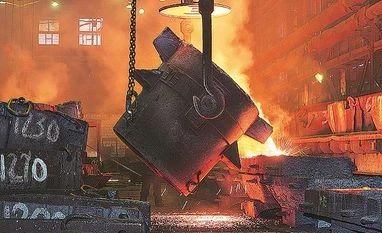Domestic steel stocks remain on a strong footing, encouraged by positive economic data from China, improving realisations, and firm volume numbers reported by companies.
After a strong rally since March-April lows and a correction thereafter, stocks of Tata Steel, JSW Steel, Jindal Steel and Power (JSPL) and Steel Authority of India (SAIL) have rebounded up to 26 per cent since September 24. And, analysts say there is more steam left in the rally.
China’s September data was encouraging as it saw 9 per cent year-on-year (YoY) surge in iron ore imports, while its steel exports declined 28 per cent YoY. Reuters reports suggest that Chinese production has improved, supported by strong demand from its infrastructure sector. This, to some extent, comforted the Street, as concerns had been building up on Chinese demand.
According to latest data, China’s gross domestic product (GDP) grew by 4.9 per cent in September quarter. Although analysts are keeping a watch on near-term Chinese demand after the National Day holidays, they feel winter production cuts should bode well for global steel prices and keep exports from China at low levels.
Meanwhile, latest data from analysts’ channel checks indicate that domestic hot-rolled coil (HRC) prices have risen for seven successive weeks to Rs 43,528 a tonne, the highest since December 2018. This should help improve profitability of domestic steel companies, and the encouraging volume numbers posted by steel makers suggest that off-take too has improved, supported by flat steel segment used for manufacturing white goods and automobiles.
Long steel products should also see pickup as construction activities have resumed after the monsoon season. Domestic steel producers have ramped up production to optimum capacity utilisation, say analysts, and the overall demand trend remains positive.
The larger players with stronger balance sheets are likely to the reap benefits compared with smaller peers. CARE Ratings says, the top five integrated steel companies account for 60 per cent of production and were able to gain further market share during the first half of financial year 2020-21 (H1FY21).
Among companies, JSPL remains most analysts’ top pick. It saw strong volume growth of 36 per cent YoY during Q2, and with the company’s capacity expansion projects complete, analysts expect benefits on operating leverage to also accrue. The pickup in construction activities should benefit JSPL more as long products constitute 70 per cent of its portfolio. It remains the preferred pick of Motilal Oswal Securities and the brokerage estimates 16 per cent annual growth in standalone Ebitda during FY20-22 and expects the divestment of its Oman business to lead to a 37 per cent decline in consolidated net debt to Rs 23,900 crore.
SAIL, too, is expected to benefit from the rebound in construction activities, because it has a large long-products portfolio. However, its high leverage remains a concern, say analysts.
Meanwhile, Tata Steel and JSW Steel already have seen strong improvement in utilisation and were running at 100 per cent and 86 per cent capacity, respectively, at the end of Q2. While JSW Steel will also benefit from higher steel prices, it needs to be seen how it manages profitability in a rising iron ore price environment, as the company is dependent on external supplies for the key raw material.
Tata Steel, the integrated player, will on the other hand benefit from resurgence in performance of Tata Steel Long Products and Tata Steel-BSL, say analysts. Credit Suisse, which remains positive on the steel cycle, is bullish on the sector and says India is relatively immune to higher ore costs, with integrated players (Tata, SAIL).
Most steel companies are expected to report strong improvement in per tonne profitability in Q2. Tata Steel BSL’s financial performance is testimony to that as it reported Ebitda per tonne of Rs 8,649 (up 73 per cent YoY), its highest level since Q1FY20. Analysts estimate Tata Steel, JSW Steel, and JSPL will report 19-45 per cent YoY growth in their per tonne profitability in Q2.
Unlock 30+ premium stories daily hand-picked by our editors, across devices on browser and app.
Pick your 5 favourite companies, get a daily email with all news updates on them.
Full access to our intuitive epaper - clip, save, share articles from any device; newspaper archives from 2006.
Preferential invites to Business Standard events.
Curated newsletters on markets, personal finance, policy & politics, start-ups, technology, and more.
)